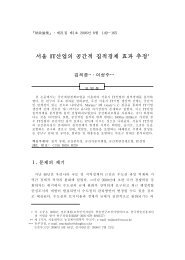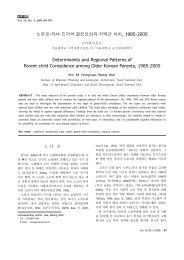무리행동과 지각된 유용성이 이러닝 컨텐츠 구매의도에 미치는 영향 ...
무리행동과 지각된 유용성이 이러닝 컨텐츠 구매의도에 미치는 영향 ...
무리행동과 지각된 유용성이 이러닝 컨텐츠 구매의도에 미치는 영향 ...
- No tags were found...
Create successful ePaper yourself
Turn your PDF publications into a flip-book with our unique Google optimized e-Paper software.
<strong>무리행동과</strong> <strong>지각된</strong> <strong>유용성이</strong> <strong>이러닝</strong> <strong>컨텐츠</strong> <strong>구매의도에</strong> <strong>미치는</strong> <strong>영향</strong><br />
system. In the second perspective, e-learning is defined as the usage of Internet technology to deliver<br />
diverse intelligence and achievement enhancing solutions. In other words, only the educations that are<br />
done through the Internet and network can be classified as e-learning. We take the second definition<br />
of e-learning for our working definition.<br />
The main goal of this study is to investigate what factors affect consumer intention to purchase e-learning<br />
contents and to identify the differential impact of the factors between consumers with purchase experience<br />
and those without the experience. To accomplish the goal of this study, it focuses on herding behavior<br />
and perceived usefulness as antecedents to behavioral intention. The proposed research model in the study<br />
extends the Technology Acceptance Model by adding herding behavior and usability to take into account<br />
the unique characteristics of e-learning content market and e-learning systems use, respectively. The current<br />
study also includes consumer experience with e-learning content purchase because the previous experience<br />
is believed to affect purchasing intention when consumers buy experience goods or services. Previous studies<br />
on e-learning did not consider the characteristics of e-learning contents market and the differential impact<br />
of consumer experience on the relationship between the antecedents and behavioral intention, which is<br />
the target of this study.<br />
This study employs a survey method to empirically test the proposed research model. A survey questionnaire<br />
was developed and distributed to 629 informants. 528 responses were collected, which consist of potential<br />
customer group (n = 133) and experienced customer group (n = 395). The data were analyzed using PLS<br />
method, a structural equation modeling method. Overall, both herding behavior and perceived usefulness<br />
influence consumer intention to purchase e-learning contents. In detail, in the case of potential customer<br />
group, herding behavior has stronger effect on purchase intention than does perceived usefulness. However,<br />
in the case of shopping-experienced customer group, perceived usefulness has stronger effect than does<br />
herding behavior. In sum, the results of the analysis show that with regard to purchasing experience, perceived<br />
usefulness and herding behavior had differential effects upon the purchase of e-learning contents.<br />
As a follow-up analysis, the interaction effects of the number of purchase transaction and herding behavior/perceived<br />
usefulness on purchase intention were investigated. The results show that there are no interaction<br />
effects.<br />
This study contributes to the literature in a couple of ways. From a theoretical perspective, this study<br />
examined and showed evidence that the characteristics of e-learning market such as continuous renewal<br />
of consumers and thus high uncertainty and individual experiences are important factors to be considered<br />
when the purchase intention of e-leraning content is studied. This study can be used as a basis for future<br />
studies on e-learning success. From a practical perspective, this study provides several important implications<br />
on what types of marketing strategies e-learning companies need to build. The bottom lines of these strategies<br />
include target group attraction, word-of-mouth management, enhancement of web site usability quality,<br />
etc. The limitations of this study are also discussed for future studies.<br />
Keywords : E-Learning, Herding, Perceived Usefulness, Word-of-Mouth, Usability<br />
106 경영정보학연구 제18권 제4호
















